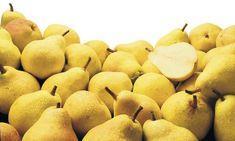
Pears go off quicker than apples because they are out of breath, European researchers have concluded.
The findings, published by Dr Pieter Verboven and his team from the Catholic University of Leuven in Belgium and the European Synchrotron Radiation Facility (ESRF) in the journal Plant Physiology, could lead to new ways of storing pears.
Apples and pears continue to ‘breathe’ after harvesting, but to keep the fruit healthy a minimum level of oxygen must be applied to all fruit cells. Only this prevents internal browning and a drop in quality.
The research team placed samples of apples and pears in the path of a synchrotron beam, used to create 3D images, according to ABC Science.
The images revealed that apples contain large irregular cavities between cells, while in pears, cells are joined by small interconnected channels. Voids in apples were often larger than the surrounding cells, but in pears the voids were smaller than the cells.
Verboven said: “It is still unclear how airways in the fruit develop, and why apples have cavity structures and pears micro-channel networks.
“The micro-channels are so small that oxygen supply to the fruit core is very limited and cells are quickly ‘out of breath’ when oxygen levels fall below the safety threshold.”
The results help explain how pears degrade after harvest, and why they are more likely to decay than apples.